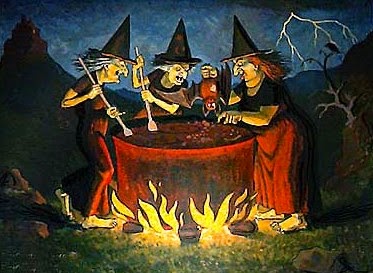 |
Shakespeare's three witches in Macbeth:
life sciences, but no available patents ... |
If you ever want evidence of the enthusiasm of intellectual property practitioners for patents, you need look no further than this weblog. While the IPKat, Merpel and their friends report, review and discuss all IP topics, some generate little more than academic interest while others stir the bile, boil the blood and generally kick-start a selection of bodily fluids that less emotive rights often fail to stimulate. But patents are the irresistible bait to which no true practitioner can fail to rise. Even subjects as apparently unsexy as the publication of patent applications and time-limits for the filing of divisional applications have been demonstrated to draw spiky comments and venomous responses from otherwise staid, stoic and respectable readers. It is therefore no surprise that, when patent law crosses the path of another enthusiast-driven topic -- in this case what is usually called "
life sciences"
[a term which, Merpel thinks, embraces "death sciences" too], fur flies, sparks sparkle, tempers rise and you can boil your kettle on a protagonist's forehead.
Life sciences have been mired in controversy in the European Union since most of today's patent practitioners can remember.
Directive 98/44 on the legal protection of biotechnological inventions -- the so-called "Biotech Directive" -- started off as a proposal some
ten years earlier, and even after its passage it was subjected to a fearsome legal challenge from the Netherlands in
Case C-377/98 that was not resolved until late 2001. Ever since then, pretty well every aspect of the patentability of life forms has been discussed, debated, dissected and diced in judicial or office proceedings
[if you require further persuasion, recent Katposts touching on life science issues may be perused here, here and here].
 |
Unwanted news
for patent owners |
But that's not all. Life sciences are a zone in which patent term extension is available via supplementary protection certificates for certain pharma and agrochemical products. This in turn has generated speculation and litigation which has spilled out from patent law into the neighbouring areas of regulation of market authorisations, abuse of monopoly and market distortion. This spillage has caused confusion, uncertainty and untold agony as litigants and their adversaries watch the clock tick down on the patent's term while questions are referred to the Court of Justice for rulings which, far from clarifying the law, often leave it more confused, less fit for purpose than it was before
[you can sample the mess that is patent term extension in Europe on the SPC weblog here].
These topics are among the fare offered in C5's forthcoming
Life Sciences IP Summit 2014 (which this weblog is, somewhat belatedly, partnering). Subtitled "Powering Business Growth through Practical and Innovative Patent Monetisation and Protection Strategies", this event is destined to address some of the most sensitive issues in the life sciences sector, and more besides. While it's described as a "Summit", the event actually starts in the foothills with a brace of pre-conference afternoon workshops (hoe to develop and cultivate a "free-to-operate" strategy and how to craft agreements that limit the potential for future litigation). If their synopses are an indication of their content, they will indeed require participants to do some work. The programme then ascends to the summit through a familiar list of nightmare-inducing issues, together with some relatively light though deadly serious entertainment in the form of a mock trial and some no doubt amusing speculation as to how the life sciences patent ecology might be affected by the shift to the new unitary patent and unified patent court.
 |
Maybe I'm naive, says
Merpel, but I still can't
see the point of a
Red Light district ... |
This Summit takes place from
Wednesday, 12 November (that's for the afternoon workshops) and carries on through to
Friday, 14 November, the venue being the Novotel Amsterdam City, Amsterdam. Merpel thinks it's quite appropriate for an event of this nature to be held in a city that is notorious for its Red Light district. After all, as a subject, life sciences is currently as sexy as they come; she's sure that the Novotel will be literally a hot bed for industry-driven discussion, dialogue and debate leading to industry-driven solutions. There's an amazing list of speakers, including too many Katfriends to mention them all by name. This Kat would love to be there, but he'll be in Australia at the time so he hopes his friends will do a spot of blogging and tweeting on some of its finer points. If you want to know more, you can access the event's website
here. The pricing schemes are a bit complex for a fictional Kat to get his head round, but some discounts are available to suitably designated souls. If you book quoting the organisers' Katcode LSIPKAT, they might just be even nicer to you ...
A matter of life and death
here
More important than life and death? Bill Shankly
here



 Reviewed by Jeremy
on
Monday, September 01, 2014
Rating:
Reviewed by Jeremy
on
Monday, September 01, 2014
Rating:
 Reviewed by Jeremy
on
Monday, September 01, 2014
Rating:
Reviewed by Jeremy
on
Monday, September 01, 2014
Rating:





![[GuestPost] G1/24: Tuning in! A take on the state of proceedings before oral proceedings](https://blogger.googleusercontent.com/img/b/R29vZ2xl/AVvXsEjZhEivE5bp7QOwZsyZXAXbVNYSmLjUthkB2Q7fm1_dpB97u5lIQeyWT9ZadUTAH3Z-hXn13VpW4vBDRPx9emCnoDV6tbUTkyvfmqPv1nNInL8XMdrAtSZ2hcRQr2LjxKovC9wTk_XyZxQ0CtX1MUrO_Muz3OJ4ld8AftymsdUmKD7xNksYMwk6/s150/Picture%201.png)

![[Guest post] ‘Ghiblification’ and the Moral Wrongs of U.S. Copyright Law](https://blogger.googleusercontent.com/img/b/R29vZ2xl/AVvXsEhxl1BQBAW3Y-asjb1xXB9eA4DYy77fky6WgR-prC-_6DeBbDqOgCUDWyiz0Q3B23MWWAXnkbS2H2js7OUwA0JQXAHmsyVFgGIHeJz7zJ791vTzOD-4SJqWFIuywFXQyd3ahybbdZd4e8IEVfcNqctvyR8lumv_Gix6Tsw5cSvbHpTI1nwvztDuAQ/s150/IMG_2179.HEIC)








No comments:
All comments must be moderated by a member of the IPKat team before they appear on the blog. Comments will not be allowed if the contravene the IPKat policy that readers' comments should not be obscene or defamatory; they should not consist of ad hominem attacks on members of the blog team or other comment-posters and they should make a constructive contribution to the discussion of the post on which they purport to comment.
It is also the IPKat policy that comments should not be made completely anonymously, and users should use a consistent name or pseudonym (which should not itself be defamatory or obscene, or that of another real person), either in the "identity" field, or at the beginning of the comment. Current practice is to, however, allow a limited number of comments that contravene this policy, provided that the comment has a high degree of relevance and the comment chain does not become too difficult to follow.
Learn more here: http://ipkitten.blogspot.com/p/want-to-complain.html